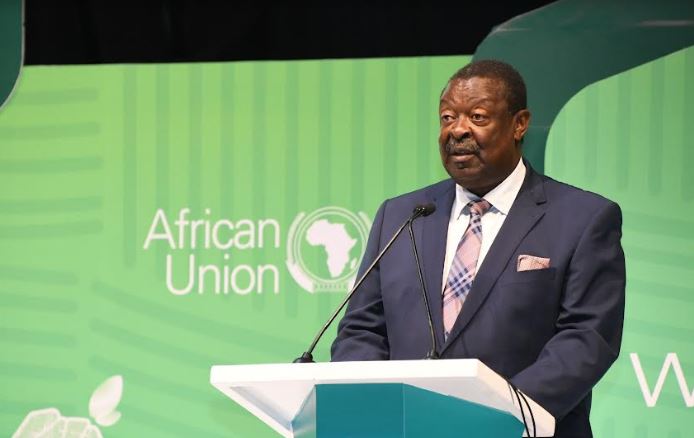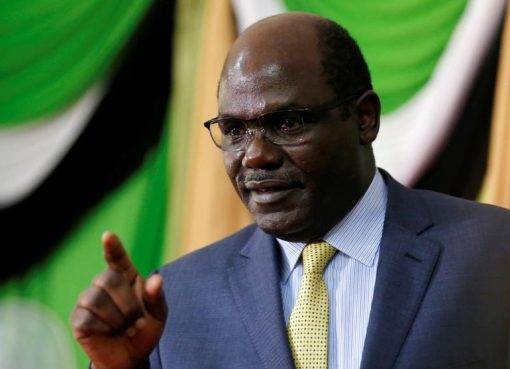There is need for the African continent to develop coordination mechanisms where all stakeholders will sit at the same table and develop action plans that address issues of fertiliser and soil health.
The Prime Cabinet Secretary and Cabinet Secretary for Foreign and Diaspora Affairs, Dr. Musalia Mudavadi, said issues of fertiliser and soil health cut across different jurisdictions, an issue that requires all stakeholders to deliberate and come up with effective and long-lasting solutions.

Musalia, who was speaking on Tuesday during the Second African Fertiliser and Soil Health (AFSH) Summit held at the Kenyatta International Convention Centre in Nairobi, also urged participants of the summit to come up with financing proposals that are practical and achievable.
“This is the only way to reach the targets set within the action plans as the economies recover,” he stated.
The three-day event that has been hosted by the Kenyan government in collaboration with the African Union (AU) has brought together over 2000 stakeholders from across the continent to evaluate the state of Africa’s soil health, network on how best issues affecting agriculture can be addressed, and engage in business at the event themed ‘Listen to the Land’ that will culminate into a high-level Presidential Summit.
In the Maputo Declaration in July 2003, Heads of State and Governments endorsed the commitment to the allocation of at least 10 per cent of national budgetary resources to agriculture and rural development policy implementation within five years.
The Prime Cabinet Secretary said he is aware that it has been difficult for the majority of African governments to allocate budgets to agriculture and rural development at the level anticipated in the Maputo declaration due to the effects of COVID-19 that have affected the economic performance of most countries and the world. Countries have also been compounded by competing resource allocation needs.

The AFSH Summit, which will be the continent’s largest soil health forum, will be held under the leadership of President William Ruto and Chaired by the Chairperson of the African Union Commission (AUC), Moussa Faki Mahamat.
Musalia said the summit has been held at a challenging time when millions of Africans across the continent are facing severe food and nutrition insecurity, an issue that requires the continent to come up with long-term and sustainable strategies on how to feed the growing African population.
He expressed appreciation to the Heads of State and Government from the AU who have provided the policy framework and guidance on the key focus of the summit, singling out the Comprehensive Africa Agriculture Development Programme, which he noted has served as the framework for action for agricultural transformation across Africa since 2003.
“We laud the Comprehensive Africa Agriculture Development Programme, an AU initiative, which supports member states in increasing investment and productivity in the agricultural sector,” added Musalia.
In his remarks, Cabinet Secretary for Agriculture and Livestock Development Mithika Linturi said soil fertility depletion has been cited as the fundamental root cause of declining per capita production due to continuous mining of soil nutrients and inappropriate farming practices, among them the use of blanket fertiliser recommendations.

He singled out crop productivity, food insecurity, a low return on agricultural investment, and environmental degradation as some of the negative effects of land degradation.
“There is need for Kenya to utilise its available land for agriculture in a sustainable manner to avoid putting pressure on the soils,” said the CS.
He announced that only 19 per cent of Kenya’s land area is arable for crop production, while that under cereals production accounts for approximately 2.7 million hectares (47 per cent) of the total arable land, which he noted puts a lot of pressure on the soils.
Some of the key declarations and commitments made by African Continent Heads of State and Government to drive agricultural productivity to improve food, nutrition, and security are the Abuja Declaration in 2006, where the declaration on fertiliser for the African Green Revolution identified the need to increase fertiliser use to stimulate agricultural productivity growth to end hunger and poverty in Africa.
In the Malabo Declaration of June 2014, African leaders declared their commitment to end hunger by 2025, and during the Soil Initiative for Africa held in September 2020, the African Union Commission issued a call to improve the health and productivity of Africa’s soils and scale proven and locally adapted technologies.
Others who spoke at the meeting were the Uganda Minister of Agriculture, Animal Industry, and Fisheries and Chair of the African Union Specialised Technical Committee on Agriculture, Rural Development, Water, and Environment, Frank Tumwebaze, and the AU Commissioner for Agriculture, Rural Development, Blue Economy, and Sustainable Environment, African Union Commission, Amb. Josefa Sacko.
The Summit was attended by Ministers from the African continent.
By Bernadette Khaduli





